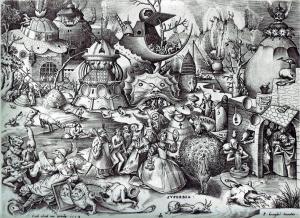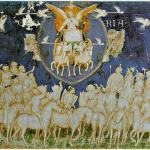
Perhaps the most dangerous sin of all, pride, can exist in the midst of other sins, or in virtue, making the person dominated by it hold on to the greatness they believe to exist in themselves. Instead of letting themselves grow and be strengthened by the grace of God, they hold on themselves, thinking they need no help, no aid from anyone. Those trapped by pride use a perception of the self which they have created, a delusional perception, to justify being aloft from all, including God:
The beginning of man’s pride is to depart from the Lord; his heart has forsaken his Maker. For the beginning of pride is sin, and the man who clings to it pours out abominations. Therefore the Lord brought upon them extraordinary afflictions, and destroyed them utterly. The Lord has cast down the thrones of rulers, and has seated the lowly in their place (Sir. 10:12-14 RSV).
Because existence is sustained only by the grace of God, a person dominated by pride hurts themselves as they try to sustain themselves apart from all, including God. They not only believe themselves to be great, so great they need nothing from anyone else, they sustain that belief with a delusional view of who they think themselves to be. They attach themselves, through their pride, to a false notion of who they are, that is, to a false self; that self, no matter how hard they try to make it real, does not exist. What they use to establish it will eventually vanish, leaving them with nothing as all the greatness which they thought they possessed vanishes from them. “Pride goes before destruction, and a haughty spirit before a fall” (Prov. 16:18 RSV).
Pride is similar to, and perhaps related to, vainglory. They are both forms of self-love. The difference is that vainglory seeks honor and glory and accolades from others, allowing the person to be open to and sustained by others so that their relationship with others can lead them to a relationship with God. Pride, however, makes people close in on themselves, thinking that they are so great that they can become independent from all things (and this way, like a god).[1] Vainglory recognizes the need for others, for it is sustained by others: pride does not.
Pride makes us hold on to ourselves, to elevate and promote ourselves to ourselves; but the problem is what we hold onto is a phantasm, and no matter how much we try to hold on to that phantasm, we will find our grasp goes right through and into the nothingness beyond. As much as we thrust that delusion forward and turn it into an idol of self-adoration, we will fall, as our attempt to uphold it will not last. The greater the delusion, the greater the fall. The solution is to empty ourselves from that pseudo-self, to let it go, that is to be humble. Then, recognizing our need for others, and for grace, we will find what we need to sustain our proper existence.
“A man’s pride will bring him low, but he who is lowly in spirit will obtain honor” (Prov. 29:23 RSV). Pride, while trying to lift us up, will reveal itself to be what makes us low. It is delusional. We lie to ourselves, proclaiming our greatness, thinking we need nothing because of how great we think we are. And there are many ways in which we can develop this pride. Often, we start out without it, seeking to do what is good and just but then we see what we have done, what we have developed in ourselves, and slowly we find pride growing in us. That is, more we acquire virtue, the more pride becomes a threat to our own spiritual well-being. Walter Hilton, in his Scale of Perfection, therefore denoted pride as a form of self-love coming out of the goodness one sees in oneself[2]:
Pride is nothing else (as learned authors say) but love of your own excellence, that is, of your own honor. Then the more you love and enjoy your own honor, the greater is your pride, and so the bigger is this image in you. If you feel in your heart a stirring of pride, that you are holier, wiser, better and more virtuous than someone else; or that God has given you grace to serve him better than others do, and you think all others beneath you, and yourself superior; or you have any other thought about yourself which shows to the sight of your soul an excellence which surpasses other men or women; and from this stirring you feed love, delight and vain pleasure in yourself, that you are like this: this is a sign that you are carrying this black image. [3]
Nikitas Stithatos further explained that those who elevate themselves through pride suffer from a great abomination which keeps them at least as far away from God as those vices they have overcome:
In the eyes of God and of those who live a Christ-like life, to act with passion because of one’s dissolute character and to take pride in one’s virtues through a spirit of self-conceit are each as evil as the other. In the first case it is shameful to even speak of the things that those enslaved to the passions do in secret (cf. Eph. 5:12); in the second case the self-vaunting of the heart is an abomination to God. The dissolute person alienates himself from God, for he is ‘flesh’ (cf. Gen 6:1), while the person who takes pride in his virtue is unclean in God’s sight because of his self-conceit.[4]
The person who is not possessed by pride, but rather, understands and mourns their sinful tendencies will find themselves justified by God, while the person filled with pride will not seek forgiveness and will have that much more difficult a journey to make if they are to have a right relationship with God. The sinner who knows themselves to be a sinner, and mourns, will find the grace of God coming to them, because they have not entirely closed themselves off to God and his love, while the person wounded with pride will not see the need for such grace as they think they can hold all things they need in and through their own greatness. They might accept the words of praise coming from others, because it verifies the greatness they think they have, but in doing so, they only make their situation worse. Pride, therefore, makes it difficult to get help, as all those who would speak with wisdom to those possessed by pride will be ignored, while those who help reinforce them in their pride will be heeded insofar as the pride remains inflamed, as St. Symeon the New Theologian understood:
Just as a flame always rises no matter in what direction one turns the wood on which it burns, so the heart of an arrogant person cannot humble itself; the more one says to help him, the greater his self-inflation. Corrected or admonished, he reacts violently; and when praised or encouraged, his exultation knows no bounds.[5]
Pride is a problem which comes to us throughout our spiritual journey. Each time we achieve some success, each time we think we have learned something or done something good, we find ourselves tempted with pride. Since beginners in the spiritual life, those beginning their journey, often find themselves with a fresh, revived spirit and emboldened by the good they think they have achieved, they are especially at risk with pride. As a warning not to be trapped by such a delusion, St. John of the Cross pointed out that those disciplines which should help us to overcome pride can become the source and foundation for pride in those of us who are not prepared:
These beginners feel so fervent and diligent in their spiritual exercises and undertakings that a certain kind of secret pride is generated in them that begets a complacency with themselves and their accomplishments, even though holy works do of their very nature cause humility. Then they develop a somewhat vain – at times very vain – desire to speak of spiritual things in others’ presence, and sometimes even to instruct rather than be instructed; in their hearts they condemn others who do not seek to have the kind of devotion they would like them to have, and sometimes they give expression to this criticism like the pharisee who despised the publican while he boasted and praised God for the good deeds he himself accomplished [Lk. 18:11-12].[6]
This is why those who are new to the faith, those who are new to some aspect of the faith, should be tried and tested before they try to take positions of leadership with others. Not only do they not know and understand as much as they think, they have yet to properly live out what they have gained. A quick transition from initiate to leader will likely cause them to be led astray with pride. It is better for us, even those called into positions of leadership, to act in humility and love, to act in service towards others so that we can keep love as the foundation of all that we do. By such love, by such focus on love, we will then be able to overcome pride because love requires us to divest all we think we have from ourselves as we give it to others, while pride encourages us to hold on to it all. It is in this fashion we can understand Hadewijch’s advice on how to deal with pride:
Do not become so stubbornly attached to anything that God may, in consequence, refuse you his grace. Do not, through pride, spare any service. Do not, through pride, refrain from giving little gifts to the poor. Do not, through pride, fail to ask anything you need and cannot well do without. Do not, through pride, be ashamed that you are hungry, thirsty, drowsy, or cold, or be ashamed of a repulsive illness, or of having shown a lack of good understanding our courtliness.[7]
We must not be ashamed by our status. We must not look for glory, but more than that, we must humble ourselves whenever pride tempts us. We must look for what we can do for others. We must not spare ourselves to let ourselves become tempted to hold on to and elevate a false notion of the self: we must, indeed, wound our pride (that is, our self-attachment) by acting out of love for others, lest we find ourselves cut off from God’s grace due to our own closure to him.
“If you truly want to be saved, brother, and to avoid the spirit of pride, then endure a little dishonor; for in this way, pride is struck down.” [8] Pride cannot bear the reality of our weakness and need. When we feel dishonored, we are given a glimpse of that weakness and a means by which we can overcome pride. Though of course, it is possible we overcome one form of pride and give in to another: as we let the wound set it, we find ourselves healed from a false perception of the self we had, only to grow stronger and better and find ourselves once again becoming prideful in what we become. The more we die to the self, the more grace we let in, the more opportunity we have for pride to bring our spiritual progression to a halt: only by a complete divesture of the false-self upon Christ will pride be entirely destroyed. Pride is often one of the first of the deadly sins, and it is also one of the last to entirely go away. Once it is put to death in Christ, once the false self is entirely dismantled, will we find ourselves entirely putting on Christ, living and thriving in him. Thus, we will find a spiritual fulfillment of the prophecy of Isaiah: “The haughty looks of man shall be brought low, and the pride of men shall be humbled; and the LORD alone will be exalted in that day” (Isa. 2:11 RSV). For once we have entirely destroyed our pride, the delusional self will have been brought to ruin, and Christ our Lord will be exalted in us and through us as we find our true self and glory in him.
[1] St. Thalassios said, “Pride and boastfulness are characterized by hypocrisy, guile, trickery, pretense and, worse of all, falsity,” St. Thalassios, “On Love, Self-Control and Life in Accordance with the Intellect,” in in The Philokalia: The Complete Text. Volume Two. Trans. G.E.H. Palmer, Philip Sherrard, Kallistos Ware et. al. (London: Faber and Faber, 1990),323. This falsity tricks not only others, but more importantly, ourselves. Pride is a form of self-deception, and the more we believe in our own treatment of ourselves under the guise of pride, the greater the lie, the more difficult it will be for us to recover from our vice.
[2] The traditional understanding of the fall of Satan, from being the greatest and best of angels, is perhaps the best representation of this problem. Satan was beautiful and glorious. He received it all from God, but because of that greatness, he lost sight of God as he looked upon and reflected upon himself. He tried to let his self take the place of God, and in doing so, he lost his connection from God, turning away from the glory which he once had.
[3]Walter Hilton, The Scale of Perfection. Trans. John P.H. Clark and Rosemary Dorward (New York: Paulist Press, 1991), 127. The image mentioned here is the image sin
[4]Nikitas Stithatos, “On the Practice of the Virtues,” in The Philokalia: The Complete Text. Volume Four. Trans. G.E.H. Palmer, Philip Sherrard, Kallistos Ware et. al. (London: Faber and Faber, 1995), 88-9.
[5] St. Symeon the New Theologian, “Practical and Theological Texts,” in The Philokalia: The Complete Text. Volume Four. Trans. G.E.H. Palmer, Philip Sherrard, Kallistos Ware et. al. (London: Faber and Faber, 1995),30.
[6] St. John of the Cross, “Dark Night of the Soul” in The Collected Works of St. John of the Cross. Trans. Kieran Kavanaugh and Otilio Rodriguez (Washington, DC: ICS Publications, 1991), 362-3.
[7] Hadewijch, Letter 24 in Hadewijch. The Complete Works. Trans. Columba Hart, OSB (New York: Paulist Press, 1980), 104.
[8] Barsanuphius and John, Letters, Volume I. trans. John Chryssavgis (Washington, DC: CUA Press, 2006), 318 [ Letter 347B].
Stay in touch! Like A Little Bit of Nothing on Facebook













